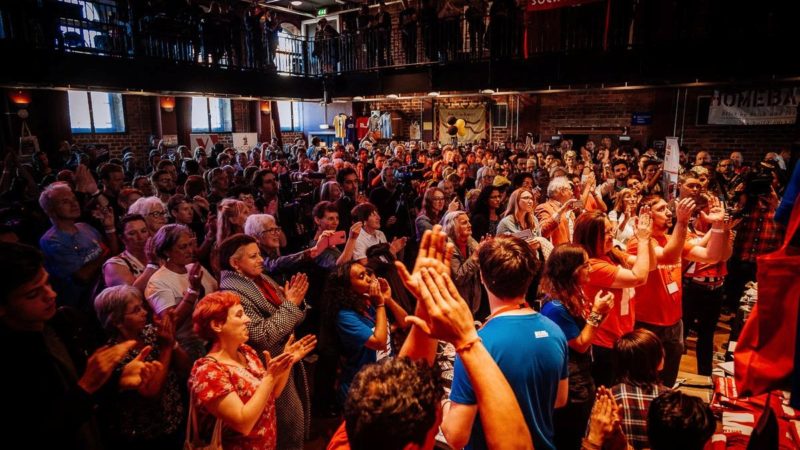
Momentum, the network of activists that grew out of Jeremy Corbyn’s first Labour leadership election campaign, has been under new leadership since the summer of last year. New chairs Gaya Sriskanthan and Andrew Scattergood were elected on the ‘Forward Momentum’ platform, which promised change. Its ‘refounding’ process has been hindered by the pandemic, however: its big evictions resistance campaign, for example, was supposed to be mostly direct action but Covid lockdowns prevented much of that.
The organisation is now aiming to rebuild itself “from the ground up” through constitutional reform that will directly involve all its members. After devoting more resources than ever before to its network of local groups, Momentum will launch a deliberative process that will ultimately go to an all-member ballot on the final proposals in December. These policies could include reshaping the make-up of the national coordinating group, changes to candidate endorsement processes or member input.
First, every local group and individual member supported by 20 members will be able to submit proposals. Next, the submissions over a three-month period will be considered by two assemblies, which will each comprise up to four NCG members, one to four trade union affiliate reps, one to two reps from Welsh Labour Grassroots/Campaign for Socialism, eight local group reps, four individual Momentum members and a facilitator. The assemblies will narrow down the ideas via consensus decision-making, and the final set will then go to a ballot of all Momentum members.
The idea behind the process is for Momentum to turn away from short-term cycles and learn the lessons from the 2019 general election, which it believes are the need to give members a definitive say in what the organisation does, to build a bigger base and to create a genuine movement. The activists feel that they were too narrowly focused on ‘one last electoral push’, rather than the political landscape more broadly.
Under new leadership and as the country emerges from the Covid crisis, Momentum organisers intend to focus as much on facing outwards to the country as they do Labour candidate selections. The group will have one big annual campaign a year around which to centre its activities.
Its trade union network is also being developed, with Momentum intent on identifying where its members are in unions and facilitating their organising in the workplace while sharing knowledge and strategies. There may eventually be branches like ‘Momentum nurses’ or ‘Momentum firefighters’.
There is the Leo Panitch leadership development programme, too, which promises to invest in the 42 activists who have been selected for the first run of the scheme, as well as the future councillors programme and a stream of community wealth building work.
“While the Labour Party leadership remains fixated on the 90s, it’s our responsibility to make sure that we organise in a way that is democratic, modern and rooted in a clear socialist politics,” co-chair Sriskanthan says. “Refounding Momentum is another step towards putting power in the hands of every Momentum member.”
Scattergood adds: “Momentum has had many successes but we also need to learn the lessons of our defeats. Refounding Momentum is about building a Momentum that can organise more effectively to win inside the Labour Party and campaign in our communities.
“We’re now in the process of rebuilding our movement from the ground up, with much more focus than ever before on organising in our workplaces and communities. Socialist strategy relies on organised working class power – and that’s what we’ve been missing in the last decade. Refounding is a huge step forwards in making Momentum into the kind of organisation that can help create that power.”
Jon Trickett, the Labour MP for Hemsworth and member of Momentum’s NCG, has endorsed the process, saying it is “time for the organisation to enter a new chapter” and this initiative marks a “new stage” in the growth of the Labour left.
“Momentum has led the way in modern campaigning techniques and mobilising a new generation of committed Labour Party activists. But the current political situation poses both risks and also opportunities for socialists. The decisions we take now may resonate for years to come,” the MP said.




More from LabourList
‘Labour is being badly misled on housing’
Reeves bets on patience over populism
‘Energy efficiency changes must work for older private renters’